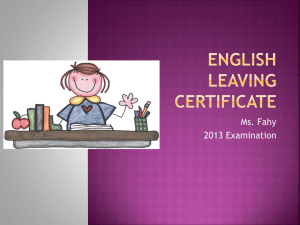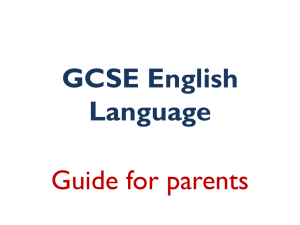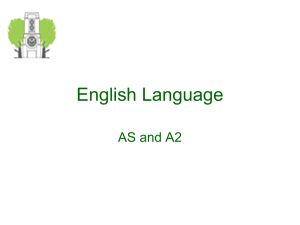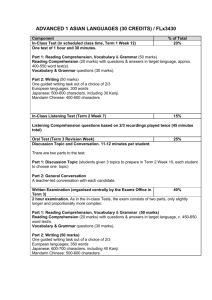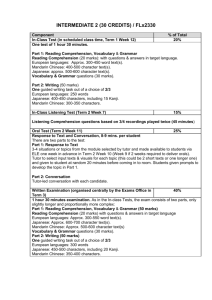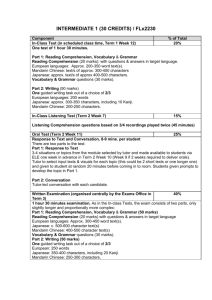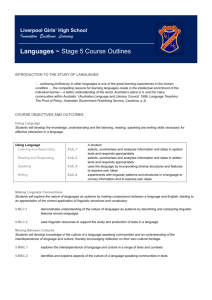VCE JAPANESE HANDBOOK
advertisement
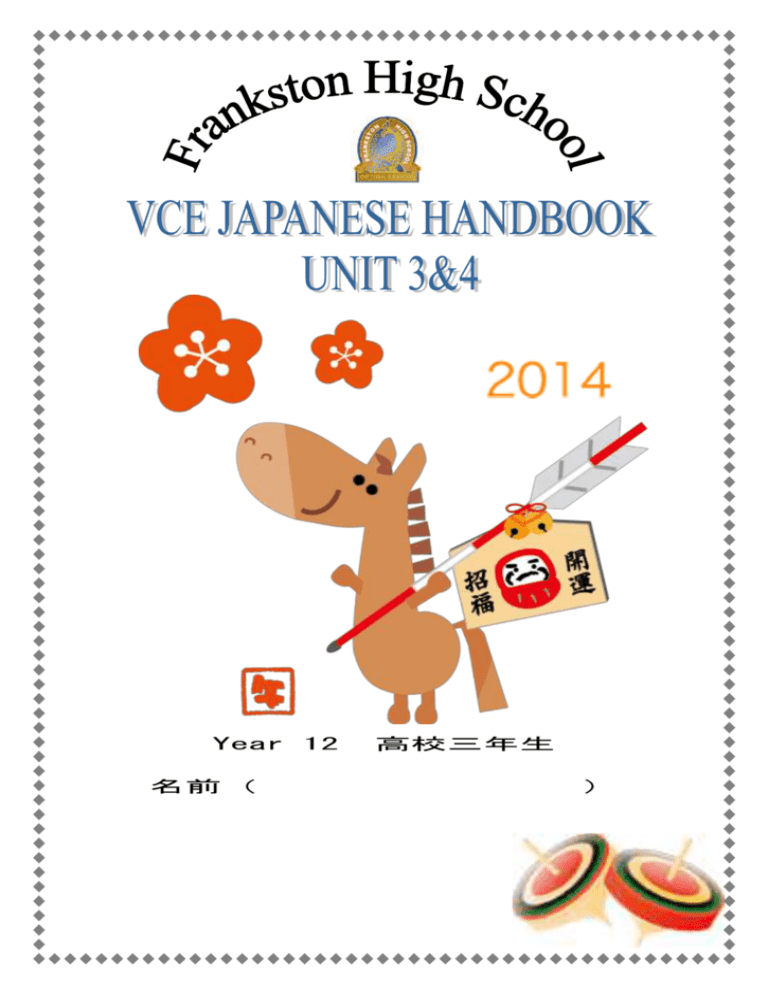
Year 12 名前( 高校三年生 ) Summary of Assessment Tasks UNIT 3 (3 activities) Outcome 1 Outcome 2 Express ideas through the Analyze and use information production of original texts. from spoken texts. (500 ji) (a response to specific questions) One activity One activity Outcome 3 Exchange information, opinions and experiences. (3 to 4 minute role-play) One activity UNIT 4 (3 activities) Outcome 1 Analyze and use information from written texts. (A response to specific questions) One activity Outcome 2 Part A: Respond critically to spoken and written texts which reflect aspects of Japanese and culture of Japanese speaking communities. (a 600ji informative, persuasive or evaluative written response) Part B: A 3 to 4 minute interview on an issue Two activities *Topics covered in Units 3 & 4 may include: Personal world Daily life Past and future Visiting Japan Getting to know people in Japan The world of work Changing in daily life Life in Japan Home and neighborhood *It must be remembered that there are a number of tertiary courses and institutions offering bonus entry points for students who have studied LOTE Units 3 & 4. A list of these courses and institutions should be available from the careers library. Students will be monitored and advised throughout the year. 1 VCE JAPANESE UNIT 3 Theme: The individual Japanese-speaking community Term 1 WEEK DATE OUTCOME 1/2/3 ASSESSMENT TASKS Express ideas through the OUTCOME production of original texts. (500 ji) 1 (高校生活Ⅱ p.1~11) Daily life WEEK 4 20 marks ( 高校生活 Ⅱ p.12~26) WEEK 6 Visiting Japan Exchange information, opinions OUTCOME and experiences: A three to four 3 minute role-play, focusing on the resolution of an issue. Life in ( 高校生活Ⅱ p.27~59) Japan WEEK 9 20 marks TOPIC & LINGUISTIC ELEMENTS Topic: Japanese sports Linguistic elements: ・According to~ ~によると~ そうです。 ・Direct/Indirect quotation ・Verb/Adj. stem そうです。 Topic: Japanese seasons and weather Linguistic elements: ・Conditional ば・ら ・Probably でしょう。 ・might かもしれません。 Topic: Leisure activities in Japan. Linguistic elements: ・Conjunctions ・Particle use ・even if/though ても・でも ・だけ・しか~ません(only) ・verb こと・の ・potential forms Term 2 WEEK DATE WEEK 5 OUTCOME 1/2/3 ASSESSMENT TASKS Analyze and use information OUTCOME from spoken texts. 2 (A response to specific questions.) Daily Life (40-50 minutes) *4-5 minutes tape (three times) with a pause of b/w 5 minutes. ( 高校生活Ⅱ p.60~81) 10 marks TOPIC & LINGUISTIC ELEMENTS Topic: Student Life in Japan and Australia.. Linguistic elements: ・てから(after doing) ・まえに(before) ・あとで(after) ・けれども・が(although /but/however) ・なぜ・どうして Why? ・からです(It’s because) ・たがる(is eager to) WEEK 8 GAT WEEK See the next page (Unit 4) WEEK 9 OUTCOME 1 *School-assessed coursework for Unit 3 contributes 25% to the final assessment. 2 VCE Theme: JAPANESE UNIT 4 The Japanese-speaking communities The changing world Term 2 DATE WEEK 9 OUTCOMES 1/2/3 OUTCOME 1 Changes in daily life 10 marks ASSESSMENT TASKS Analyze and use information from written texts(1200ji-1500ji): (A response to specific questions.) (500ji) (80-100 minutes) (高校生活Ⅱ p.128~140) *Dictionary to be used. TOPIC & LINGUISTIC ELEMENTS Topic: Technology progress and students’ life Linguistic elements: ・While ながら ・のに(even though) ・transitive/intransitive verbs Term 3 DATE WEEK 1-5 WEEK 6 OUTCOMES ASSESSMENT TASKS 1/2/3 Detailed Theme: The Japanese-speaking study communities Topic: Visiting in Japan Respond critically to spoken and OUTCOME written texts which reflect aspects 2 of Japanese and culture of (Part A) Japanese speaking communities. Visiting (A 600ji informative, persuasive or Japan evaluative written response.) (80-100 minutes) ( 高校生活 Ⅱ p.83~101) 20 marks Respond critically to spoken and OUTCOME written texts which reflect aspects 2 of Japanese and culture of (Part B) Japanese speaking communities. (A 3 to 4 minute-interview on an Visiting issue related to the texts studied.) Japan ( 高校生活Ⅱ p.102~127) Sub-topics: Japanese diet/etiquette 20 marks Housing in Japan Tourist attractions School system in Japan Living in home-stay Leisure activities in Japan etc. TOPIC & LINGUISTIC ELEMENTS Topic: Japanese restaurants and Japanese people’s diet Linguistic elements: ・Indirect questions ・volitional forms Topic: A trip to Japan/ Living in Japan. Linguistic elements: ・Use of verb stem ・Making nouns from adjectives ・~し(and) ・Comparison ・て form もらう・くれる・あげ る *School-assessed coursework for Unit 4 contributes 25% to the final assessment. 3 Term 4 ORAL EXAM Section 1: Conversation(7 minutes) General conversation about the student’s personal world. Eg. School, home life and friends, interests and aspirations. Section 2: Discussion(8 minutes) Students will discuss about the sub-topic chosen for detailed study and in no more than one minute, briefly introduce the main focus of their sub-topic. Section 1: Listening and reporting Part A: Response in English Part B: Response in Japanese Section 2: Reading and responding Part A: Response in English Part B: Response in Japanese (250-300 ji) Section 3: Writing(400-450 ji) 12.5 % Sec.1 A: 10 % B: 5 % Sec.2 WRITTEN A: 10% EXAM B: 5% ( 2 hours with 10 minutes Sec.3 reading time) 7.5 % TOTAL Total: 37.5% 50 % The Daruma doll is a Japanese traditional doll. Daruma dolls are seen as a symbol of perseverance and good luck. The eyes of Daruma are often blank when sold. Daruma’s blank eyes are means to keep track of goals or big tasks and motivate them to work to the finish. The recipient of the doll fills in one eye upon setting the goal, then the other upon fulfilling it. In this way, every time they see the one-eyed Daruma, they recall the goal. 4 Unit 3 School Assessed Coursework UNIT 3 OUTCOME 1 --- Writing task Marks Allocated Criteria 1.Appropriateness of structure and sequence 2.Relevance, breadth, and depth of content 3.Accuracy of vocabulary and grammar 4.Range and appropriateness vocabulary and grammar Marks Given Comments 5 5 5 of 5 /20 UNIT 3 OUTCOME 2 --- Listening task Criteria Marks Allocated 1.Capacity to understand general and specific aspects of texts 5 2.Capacity to convey information accurately and appropriately 5 Marks Given Comments /10 UNIT 3 OUTCOME 3 --- Speaking task Marks Allocated Criteria 1.Capacity to maintain and advance the exchange appropriately and effectively 2.Relevance,breadth,and depth of information, opinions and ideas 3.Accuracy of vocabulary and grammar 4.Range and appropriateness vocabulary and grammar 5.Clarity of expression Marks Given Comments 4 4 4 of 4 4 /20 5 Unit 4 School Assessed Coursework UNIT 4 OUTCOME 1 --- Reading task Marks Allocated Criteria 1.Capacity to understand general and specific aspects of texts 2.Capacity to convey information accurately and appropriately Marks Given Comments 5 5 /10 UNIT 4 OUTCOME 2 (Part A) ---Writing task Marks Allocated Criteria 1.Appropriateness of structure and sequence 2.Relevance,breadth,and depth of content 3.Accuracy of vocabulary and grammar Marks Given Comments 5 5 5 4.Range and appropriateness of vocabulary and grammar 5 /20 UNIT4 OUTCOME 2 (Part B) --- Speaking task Marks Allocated Criteria 1.Capacity to maintain and advance the exchange appropriately and effectively 2.Relevance,breadth,and depth of information, opinions and ideas 3.Accuracy of vocabulary and grammar Marks Given Comments 4 4 4 4.Range and appropriateness of vocabulary and grammar 5.Clarity of expression 4 4 /20 6
